沪教版英语6BU5重点笔记
沪教牛津版六年级英语下(Unit5 基础知识梳理)
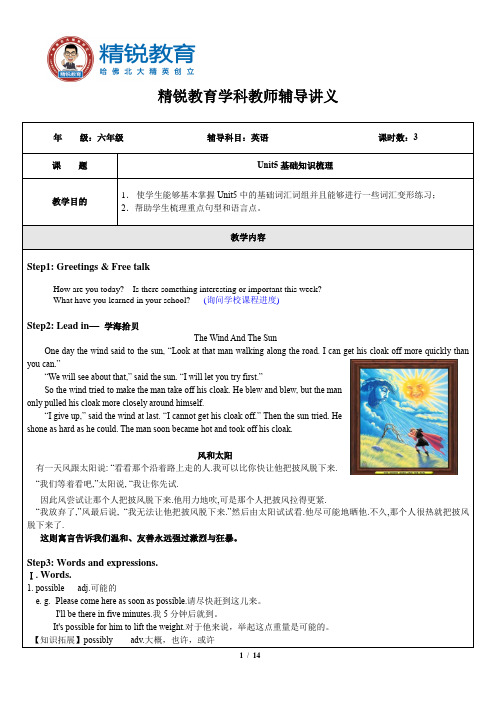
精锐教育学科教师辅导讲义年级:六年级辅导科目:英语课时数:3课题Unit5基础知识梳理教学目的1.使学生能够基本掌握Unit5中的基础词汇词组并且能够进行一些词汇变形练习;2.帮助学生梳理重点句型和语言点。
教学内容Step1: Greetings & Free talkHow are you today? Is there something interesting or important this week?What have you learned in your school? (询问学校课程进度)Step2: Lead in—学海拾贝The Wind And The SunOne day the wind said to the sun, “Look at that man walking along the road. I can get his cloak off more quickly than you can.”“We will see about that,” said the sun. “I will let you try first.”So the wind tried to make the man take off his cloak. He blew and blew, but the manonly pulled his cloak more closely around himself.“I give up,” said the wind at last. “I cannot get his cloak off.” Then the sun tried. Heshone as hard as he could. The man soon became hot and took off his cloak.风和太阳有一天风跟太阳说: “看看那个沿着路上走的人.我可以比你快让他把披风脱下来.“我们等着看吧,”太阳说, “我让你先试.因此风尝试让那个人把披风脱下来.他用力地吹,可是那个人把披风拉得更紧.“我放弃了,”风最后说, “我无法让他把披风脱下来.”然后由太阳试试看.他尽可能地晒他.不久,那个人很热就把披风脱下来了.这则寓言告诉我们温和、友善永远强过激烈与狂暴。
牛津上海版六年级英语上册Unit 5知识点归纳

牛津上海版六年级英语上册Unit 5知识点归纳一.课前回顾far away from 远离go shopping 去购物a good idea 一个好主意at weekends 在周末come back (=go back) 回来Have a barbecue 去烧烤Plan to do sth 计划去做某事Speng …on sth 花费时间做某事Spend … in doing sth 花费时间做某事make sandcastles / a sandcastle 做沙雕on (island) 在岛上fly kites 放风筝Let sb (not) do sth 让某人做某事Have a good time=enjoy one self 玩得高兴Something special 特别的东西二.单词理解1.Programme n. 活动安排n.计划;节目;课程;(演出或活动的)程序vt.计划;训练;培养;预调vi.编程序;制作节目词性转换:n. programming 设计,规划;编制程序,[计] 程序编制programmer 程序员,[计][自] 程序设计员词语辨析: programme, project, scheme, plan,design,例句:The broadcaster bit off the music programme.广播电台中断音乐节目。
The programme would abend after the third line.程序在第三行以后会异常终止。
That was a health programme to benefit everyone.那是一项对人人都有好处的健康计划。
Yesterday's programme was rather dul2.arrive v. 到达;成功;达成;出生短语:arrive at 达到,达成;到达某地arrive in 抵达,到达arrive from 从某地来(这里)arrive on 到达arrive home 到家arrive at a conclusion 得出一个结论arrive at a decision 决定下来to arrive late 迟到词性转换n.arrival 到来;到达;到达者arriver 到达者词语辨析: arrive, attain, reach, achievearrive at后接小地方arrive in后接大地方e.g.I arrive at school at7:15.He will arrive in Shanghai at two o’clock.例句:We must clear the room before our guests arrive.我们必须在客人到达之前把房间收拾好。
牛津沪教版英语六年级上6A-Unit5

六年级上U5Word1.Programmen. (1)活动安排e. g. What’s the programme for tomorrow?明天安排了什么活动?Do you know the programmes about Open Day?你知道有关开放日的活动安排吗?(2)(广播或电视)节目e.g. They're putting on a programme about wine-making.他们正在推出一个介绍酿酒方法的节目。
This programme is about the environment and human beings.这个节目是关于人类与环境的。
v. (1)计划安排某事物e. g. They are programming a music festival.他们正在为音乐会演编排节目。
Miss Guo and her students are programming their Open Day. 郭老师和她的学生正在安排开放日的活动。
(2)使……按预定的步骤进行(尤指自动地或不假思索地)e.g. The video is programmed to switch itself on at ten o'clock. 这台录傢机已调好在十点钟自动开机。
Everything is programmed to complete as the order. 一切将按顺序完成。
[常见词组]programme music标题音乐programme note简介;剧情2. entrancen. (1)入口处e. g. Where is the entrance to the cave?这个洞穴的入口在哪里?There are many policemen at the entrance of the hall.大厅入口处有很多警察。
(2)进来,进入e. g. The hero makes his entrance in Act 2. 这位英雄在第2幕出场。
沪教版六年级上册英语Unit 5 Animals in danger讲义(教师版)

Unit 5 Animals in danger一、重点词汇及拓展1. thousand n.千词汇拓展:five thousand 五千thousands of 成千上万e.g. There are only about one thousand pandas in the wild. 在野外大概有一千只熊猫。
2. hundred n.百词汇拓展:three hundred 三百hundreds of 成百上千e.g. Hundreds of people went for a trip during the holiday. 成百上千的人们在假期期间旅游。
3.wild adj.野生的,野生环境n.野外词汇拓展:wildlife 野生动植物in the wild 在野外e.g. Wild animals are in danger. 野生动物在危险中。
4. South China tiger n.华南虎e.g. There are only a few South China tiger now. 现在仅仅有极少数的华南虎。
5. blue whale n.蓝鲸e.g. Blue whales are the largest animals. 蓝鲸是最大的动物。
6.way n. 路方法方式词汇拓展:highway 公路大路subway 地铁waterway 水路航路on one’s way home 在某人回家的路上e.g. I met him on my way home. 我回家的路上遇见了他。
7.die v. 死,死亡词汇拓展:death n. 死亡过去式died 现在分词dyinge.g. A year later, his dog died. 一年后他的狗死了。
8. rhino n.犀牛词汇拓展:rhino 或rhinose.g. It’s a black baby rhino. 那是一只黑色的犀牛宝宝。
牛津上海版6AUnit5-Unit6重要知识点复习
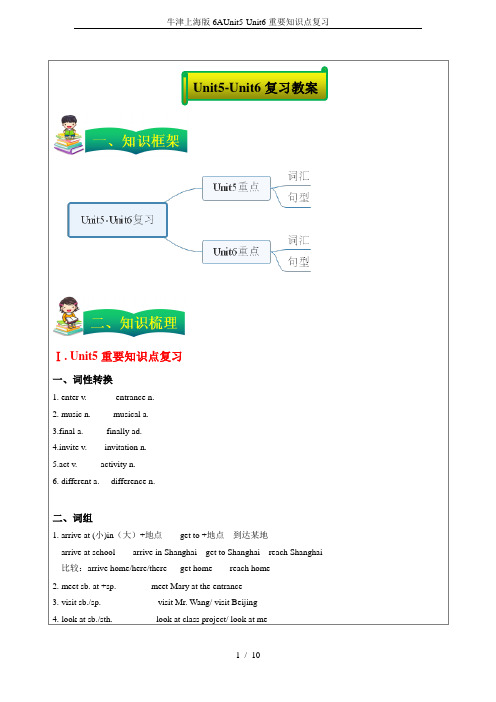
Unit5-Unit6复习教案Ⅰ. Unit5重要知识点复习一、词性转换1. enter v.----------entrance n.2. music n. -------musical a.3.final a.--------finally ad.4.invite v.------invitation n.5.act v.--------activity n.6. different a.----difference n.二、词组1. arrive at (小)in(大)+地点get to +地点到达某地arrive at school arrive in Shanghai get to Shanghai reach Shanghai 比较:arrive home/here/there get home reach home2.meet sb. at +sp. meet Mary at the entrance3.visit sb./sp. visit Mr. Wang/ visit Beijing4.look at sb./sth. look at class project/ look at meHe has _______ (gone ,been ) to the library5. On my way to school, I see a few shops, I _______ (too, also) see lots of people.I.Choose the best answer (选择) (错误率:掌握情况:)1. Would you like _______ shopping at weekends/A. goB. goingC. goesD. to go2.The teacher is talking _______ my father ______ my study.A. to; toB. to; withC. with; aboutD. with; to3._______ you'd like to go to work by light rail?It's quick.A. WhatB. WhyC. IfD. Because4.I'd like to read books when I am ______ the bus.A. byB. onC. inD. at5.______ time do your family members usually spend travelling in a day?A. How longB. How manyC. How muchD. How often6.I will visit a friend when I_______ free tomorrow.A. will beB. shall beC. amD. am going to be7.Most of the children enjoy _______ computer games.A. playB. playingC. playedD. to play8.He has two basketballs. One is new, ______ is old.A. the otherB. otherC. the othersD. othes9._______ were you born?On May 12 ,1985.A. WhatB. WhichC. WhenD. Where10.It takes me _____ an hour to go to the museum.A. neverB. aboutC. alsoD. alwaysⅡ. Complete the sentences with the given words in their proper forms. (用所给单词的适当形式填空)(错误率:掌握情况:)1. On Sundays, there are many people in several ________ (temple).2. Jim always helps his mother _____ (clean) the house.Boys and girls who want to be strong must get plenty of sleep.1. What do we do at night?We _______________________________________.2. When does our body grow most?Our body grows most while ___________________________________. 3.What may cause us to feel tired in the morning?We will feel tired if we do not get __________________________________.4.How many hours of sleep should 9-year-old children have?They need _______________________________ of sleep every night.5. What must children do to be strong?They must ______________________________________1.默写两个单元的单词和词组。
沪教牛津版六年级英语下(Unit5 语法点梳理以及能力训练)
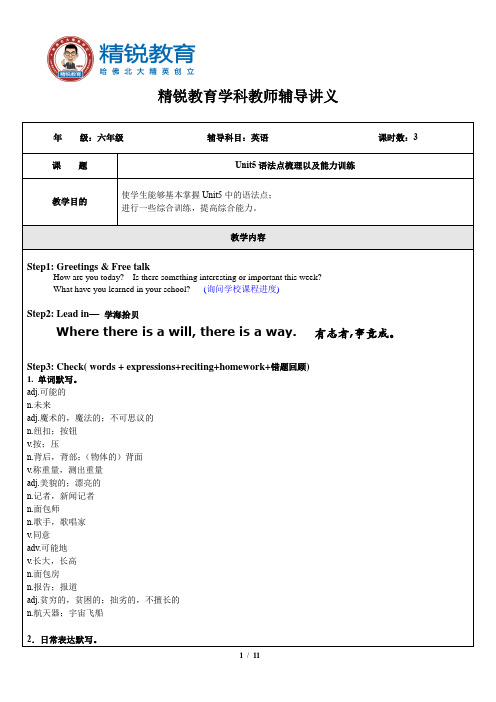
精锐教育学科教师辅导讲义e. g. I will have a party next Saturday. I hope you can come.下周六我将举行一次派对,我希望你能来。
If it doesn't rain tomorrow, we are going to the Summer Palace.如果明天不下雨,我们就去颐和园。
When will the train arrive? 火车什么时间到?(2)表示预料中将要发生的动作或情况。
e. g. You will feel better after having this medicine.你吃了这药就会感觉好一些。
.I think it will rain this afternoon.我今天下午会下雨。
(3)表示将来经常或反复发生的动作。
e. g. I'll come and see you every Sunday next year.明年我将每周日来看你。
We shall come to work in this factory every year.我们将每年来到这个工厂劳动。
(4)“be going to+动词原形”结构表示现在打算在最近或将来要做的事,或表示说话人根据已有的迹象认为可能要发生的事情。
e. g. It is going to rain this afternoon.今天下午要下雨。
Are you going to have a new subject next year? 明年你们将学一门新学科吗?2. 情态动词have to的用法have to属于情态动词,意为“必须;不得不”。
但在用法上与情态动词有所不同,它会随着人称与数及时态的变化而变化。
它的第三人称单数用has to,过去式是had to。
have to的疑问及否定形式通常借助于助动词do/does/did构成。
e. g. She isn't very well these days and has to stay at home. 她这几天身体不太好,不得不待在家里。
牛津沪教版六年级上6A-Unit 5知识点梳理 + 拓展阅读
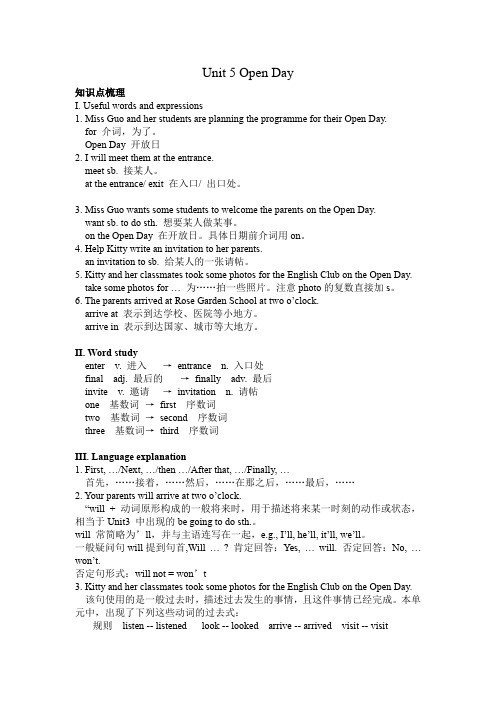
Unit 5 Open Day知识点梳理I. Useful words and expressions1. Miss Guo and her students are planning the programme for their Open Day.for 介词,为了。
Open Day 开放日2. I will meet them at the entrance.meet sb. 接某人。
at the entrance/ exit 在入口/ 出口处。
3. Miss Guo wants some students to welcome the parents on the Open Day.want sb. to do sth. 想要某人做某事。
on the Open Day 在开放日。
具体日期前介词用on。
4. Help Kitty write an invitation to her parents.an invitation to sb. 给某人的一张请帖。
5. Kitty and her classmates took some photos for the English Club on the Open Day. take some photos for … 为……拍一些照片。
注意photo的复数直接加s。
6. The parents arrived at Rose Garden School at two o’clock.arrive at 表示到达学校、医院等小地方。
arrive in 表示到达国家、城市等大地方。
II. Word studyenter v. 进入→entrance n. 入口处final adj. 最后的→finally adv. 最后invite v. 邀请→invitation n. 请帖one 基数词→first 序数词two 基数词→second 序数词three 基数词→third 序数词III. Language explanation1. First, …/Next, …/then …/After that, …/Finally, …首先,……接着,……然后,……在那之后,……最后,……2. Your parents will arrive at two o’clock.“will + 动词原形构成的一般将来时,用于描述将来某一时刻的动作或状态,相当于Unit3 中出现的be going to do sth.。
2022-2023学年上海牛津版英语六年级上册Unit 5知识点梳理

6AU5知识点梳理1. an entrance /ˈentrəns/ (n.) 入口at the entrance 在入口the entrance to the cinema 电影院的入口→ enter (vt.) = go/come into 进入注意:没有enter into !!Ant: exit (n.) 出口an exitfire exit 消防通道;emergency exit 紧急出口exit (v.) = go out 出去2.choir (n.) /ˈkwaɪə(r)/ 合唱团;唱诗班3. arrive (v.) 到达arrive in + 大地点(如:国家、城市)e.g. arrive in Japan, arrive in Shanghaiarrive at + 小地点(如:具体地点)e.g. arrive at the airport / the hotel注意:arrive home / here / there 不加介词arrive in/at sp. = get to sp. = reach sp.→ arrival (n.) 到达arrival time 到达时间Ant: leave / depart (v.) 离开4. 序列副词:4步:first, next, then, finally5步:first, next, then, after that, finally① first (adv.)e.g. I must do my homework first.e.g. When did you first meet him?(ordinal number 序列数)e.g. first one, first time, ...② next (adv.)e.g. What happened next?(adj.) the next train/room, next morning/week/year③ finally (adv.)= in the end = at last 最后e.g. The movie finally started half an hour late.e.g. Finally, I passed the exam through hard work.→final (adj.) 最后的e.g. final exam 期末考试5. Next, they’ll look at our class project.look at 看& see 看到类似用法:listen to 听& hear 听到Can you see me? 你能看到我吗?Can you look at me? 你能看我吗?e.g. He listened to the audio but heard nothing. 他听了音频,但什么都没听到。
沪教版六年级上册英语Unit5 Animals in danger知识点习题

Unit 5 Animals in danger 一、基本知识点(一)重点词汇:thousand [ˈθaʊznd] n.一千hundred ['hʌndrəd] n.一百wild[wʌɪld] adj.野生的n.野生环境way[weɪ] n. 路,方式die[dʌɪ] n. 死亡learn [ləːn]v.学会send[sɛnd] v. 发送(二)短语:be in danger 处于危险中one thousand six hundred 一千六South China tiger 华南虎ten thousand 一万in the wild 在野生环境中in the past 在过去on her way 在路上take care of 照顾go for a walk 去散步drive away 赶走grow up 成长send...back to 把...送回去...years later ...年后(三)重点句型:(1)There be 句型In the past, there were many pandas.在过去,有许多的熊猫。
(2)These animals are in danger.这些动物处于危险中。
(3)She found Elsa on her way home.在她回家路上,她找到了Elsa。
(4)Then Joy sent her back to the wild.然后Joy把她送回野生环境中。
(四)重难点、易错点:(1)本单元动词过去式的不规则变化find----found go----went grow---grew drive----drove send---sent (2)a lot 和a lot of 的区别He eats a lot.There were a lot of pandas in the past.【讲解】a lot of 等于many, 后面加可数名词的复数或者不可数名词a lot 相当于一个副词短语,用在动词后(3)名词变复数不规则变化wolf 复数---wolves(4)字母组合发音规律:音标[ u:] ue,u-e,oo[ʊ] u,oo(5)数词的用法:hundred, thousand二、典型例题知识点一:词汇的考察例1:三百_______【解析】答案:three hundred 注意区别hundreds of(成百上千)与hundred(一百)。
上海牛津英语6BU5知识点

6BU5 notes1.possible----possibly------impossible------possiblity可能的adv. Adj. 不可能的n. 可能性e.g. This is the __________ answer.e.g. I will _______ be a writer.e.g. That’s _______! He won’t do that.e.g. I should know the __________.2.in the future 在将来in the past 在过去in the past few years 在过去的几年里e.g. I __________ a teacher in the future. (be)e.g. I _______ a singer in the past. (be)e.g. Shanghai ______________ a lot in the past few years. (change)3.magic------- magicianadj. 魔幻的n. 魔术师e.g. It is a _______ camera.e.g. Liuqian is one of the most famous ________ in the world.4.She wants to take a photograph ______ the camera.She waited ____ the shop _____ her grandfather.She puts ____ a 20 note and reads the note ____ the back.This is me ____ 15 years’ time.She is good ______ cooking. But she is poor _____ singing.I hope I can do well ____ Chinese.5.have to do ----- don’t have to dohad to do ---------didn’t have to doe.g. I have to pay ten yuan.(否定)I ________ ________ to pay ten yuan.==I _____ _____ ten yuan.6.That’s what I would like to be.That’s ______ I will see in the film.That’s ______ we will come back.That’s _____ I like it.7.be interested in ==be keen on == show interest ine.g. He is interested in music.==He is _________ _____ music.==He _______ ________ in music.8.learn + how + to do 学习如何做某事e.g. learn how to make sick people bettere.g. learn how to use computers9.问身高e.g. He is 170 cm tall._______ ______ is he?________ _______ _________?问体重e.g. He is 49 k.g._______ ________ is he?______ ________ does he _______?________ ______ ______?10.agree------ disagree------- agreementv. 同意v. 不同意n. 协议e.g. Do you _______ with me?e.g. He ________ with you, he went to Shanghai instead.e.g. please look at the _________.11.bake------baker--------bakerye.g. That ______ is _________ cakes in the _______.12.sing-----song------singere.g. That famous _______ has _______ that ______ many times.13.grow------grew------growne.g. He _______ bigger this year.e.g. He ______ many flowers last year.。
6BU5要点
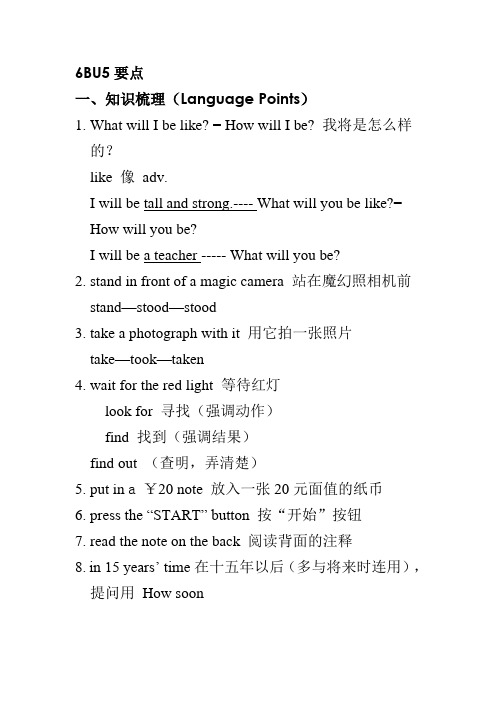
6BU5要点一、知识梳理(Language Points)1. What will I be like? = How will I be? 我将是怎么样的?like 像adv.I will be tall and strong.---- What will you be like?= How will you be?I will be a teacher ----- What will you be?2. stand in front of a magic camera 站在魔幻照相机前stand—stood—stood3. take a photograph with it 用它拍一张照片take—took—taken4. wait for the red light 等待红灯look for 寻找(强调动作)find 找到(强调结果)find out (查明,弄清楚)5. put in a ¥20 note 放入一张20元面值的纸币6. press the “START” button 按“开始”按钮7. read the note on the back 阅读背面的注释8. in 15 years’ time在十五年以后(多与将来时连用),提问用How soon9. be 165 centimeters tall 将是165厘米高, 提问用How tall are you?或What’s your height?10. weigh 55 kilograms 称得55公斤,提问用How much do you weigh? 或What’s your weight?或者How heavy are you? 回答也可用I am 55 kilograms heavy.11. an astronaut 一个宇航员12. grow bigger长得更大13. 比较级+比较级表示越来越taller and taller,more and more beautifulcleaner and more beautiful14. possible adj. 可能的my possible futurepossibly ad.可能地I will possibly be a doctor in the future.将来我可能是一个医生。
6AM2U5知识点

上海师范大学继续教育学院浦东上南教学点牛津英语6A秋季班6AM2U5知识点一、单词拓展1. programme n. 活动安排;电视节目2. enter = go into v. 进入n. ____________________在入口处 at the entrance3. noticeboard n. 布告栏4. project n. 项目;工程;课题5. finally adv. 最后;终于= _______________ =________________6. gym n. 健身房7.在一/二/三/四/五/八/九/十一/十二楼on the _________ / ___________ / ___________ / ___________ / __________ / __________ / ___________ / ___________ / ___________ floor8. invite v. 邀请邀请(信)n. _________________邀请某人做某事invite sb. to do sth.给某人写一封邀请信write an invitation to sb.9. 昨天n. _______________ 今天n. _______________明天n. _______________前天_________________________________后天_________________________________10. plan v. 计划planned(过去式)planned(过去分词)制定一个计划make a plan计划做某事plan to do sth.为学校计划一个开放日plan an open day for the school11. meet的过去式/过去分词meet --- met --- met迎接某人meet sb.二、词组拓展1. 在开放日on the Open Day2. 到达某地arrive at + 小地方in + 大地方= get to = reacharrive的过去式/过去分词arrive --- arrived --- arrivedget的过去式/过去分词get --- got --- got / gottenreach的过去式/过去分词reach --- reached --- reachede.g. 1) The parents arrived ___________ Rose Garden School at two o'clock.= The parents got to / reached Rose Garden School at two o'clock.2) We will arrive ____________ England in two days.= We will get to / reach England in two days.3. 在大厅in the hall4. 在图书馆in the library5. 想要某人做某事want sb. to do sth.6. 在不同地方in different places7. take的过去式/过去分词take --- took --- taken拍照take photos8. have/has的过去式/过去分词have / has --- had --- had过得愉快have a good time = enjoy oneself三、语法点/句型1. 一般将来时1)结构:①be going to + 动词原形(M2U4)★②will + 动词原形2)时间标志:tomorrow, next + 时间(next month / next year), in +一段时间( in an hour / in ten years’ time ), this + 时间(this afternoon / this Sunday), soon等。
沪教版六年级英语上册全册单元知识点
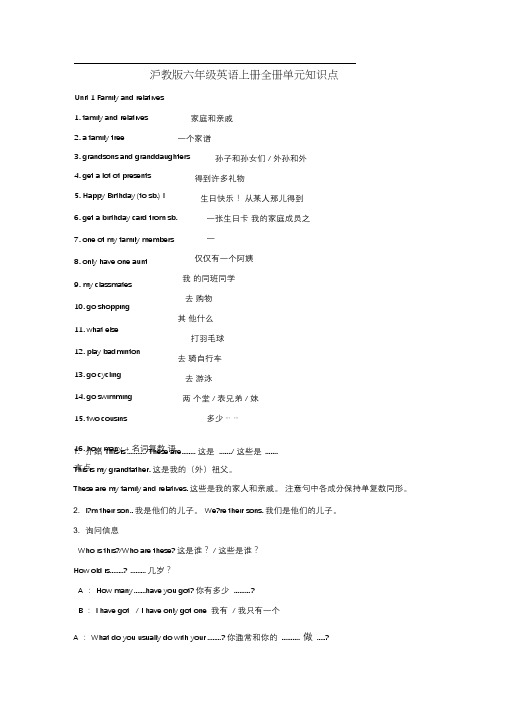
沪教版六年级英语上册全册单元知识点1. 介绍 This is ........... /These are ........ 这是 ......./ 这些是 .......This is my grandfather. 这是我的(外)祖父。
These are my family and relatives. 这些是我的家人和亲戚。
注意句中各成分保持单复数同形。
2. I?m their son.. 我是他们的儿子。
We?re their sons. 我们是他们的儿子。
3. 询问信息Who is this?/Who are these? 这是谁? / 这些是谁?How old is ........ ? ......... 几岁?A : How many ....... h ave you got? 你有多少 ......... ?B : I have got / I have only got one 我有 / 我只有一个A : What do you usually do with your ........ ? 你通常和你的 .......... 做 ..... ?Unit 1 Family and relatives1. family and relatives2. a family tree3. grandsons and granddaughters4. get a lot of presents5. Happy Birthday (to sb.) !6. get a birthday card from sb.7. one of my family members8. only have one aunt 9. my classmates 10. go shopping11. what else 12. play badminton 13. go cycling14. go swimming 15. two cousins 16. how many + 名词复数 语言点 家庭和亲戚 一个家谱 孙子和孙女们 / 外孙和外 得到许多礼物 生日快乐! 从某人那儿得到一张生日卡 我的家庭成员之一 仅仅有一个阿姨 我 的同班同学 去 购物 其 他什么 打羽毛球 去 骑自行车 去 游泳 两 个堂 / 表兄弟 / 妹 多少 ⋯⋯B :I always/usually/sometimes/never do sth. with my ......... 我总是/ 通常/ 有时候/ 从不和我的... 做...How many uncles do you have?你有多少个叔叔?How many 后面接可数名词的复数形式。
Unit5单元知识点牛津上海版(试用本)六年级英语下册
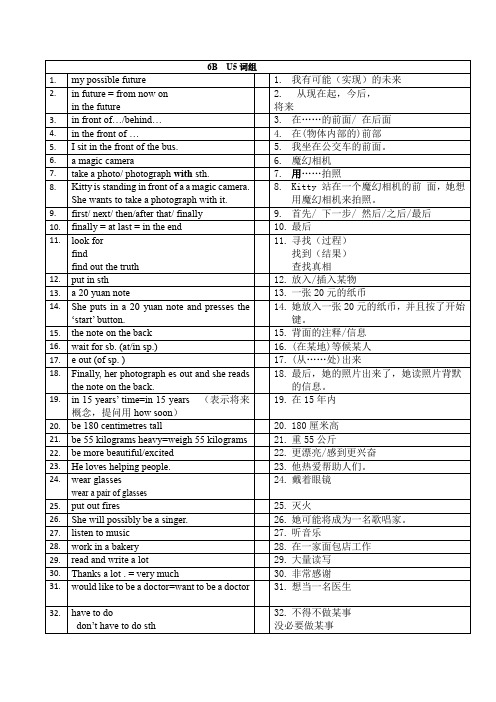
1.teach (v )教—teacher(n)老师;sing(v) 唱—singer (n)歌手;2.report(v)报告—reporter(n)记着;photograph(v)拍照—photographer(n)摄影家;3.wait(v) 等待—waiter (n)男服务员/ waitress (n) 女服务员act(v) 表演actor(n) 男演员/ actress(n) 女演员4.dance(v)跳舞——dancer(n)舞者;bake(v)烘焙——baker(n)面包师;5.drive(v)驾驶——driver(n)司机;write(v)写作——writer (n)作者6.cook(v)(烹调)——cook(n) 厨师;piano(n)(钢琴)—pianist(n)钢琴家7.possible(adj.)可能的—possibly (adv.) 可能地8.impossible (adj.)不可能impossibly (adv.) 不可能地9.grow(v)成长—growth(n) 成长weigh (v)—weight (n)10.goodlooking(adj.)好看的handsome (adj.)英俊的agree (v) 同意—disagree(v)不同意—agreement(n)协议11.magic (n)魔术magician (n)魔术师作文:句型:I’d like to be a reporter, because I am good at writing and taking photos.I’d like to be a baker, because I like eating delicious bread and cakes.I’d like to be a pilot, because I want to fly a plane in the sky, and take people to many different places. I’d like to be an astronaut, because I want to fly a spacecraft and find out the secrets of the space.模版:When I grow up, I’ll be ______ and _______. I’ll possibly be ___________, but I’d like to be ____________. Because I want to _______________________. Now, I’m good at ____________, but poor at ________. I have to practise __________ more. Besides, I have to learn _________________. I’ll try my best to make my dream e true.范文:When I grow up, I’d like to be a singer. Because I like singing very much and I think to be a singer is really an exciting thing. In my opinion, music is very important to us. It can bring us happiness and make us feel relaxed. Now, I should learn more about music and practise singing more. I’m sure my dream will e true one day.。
上海牛津6BU5重难点
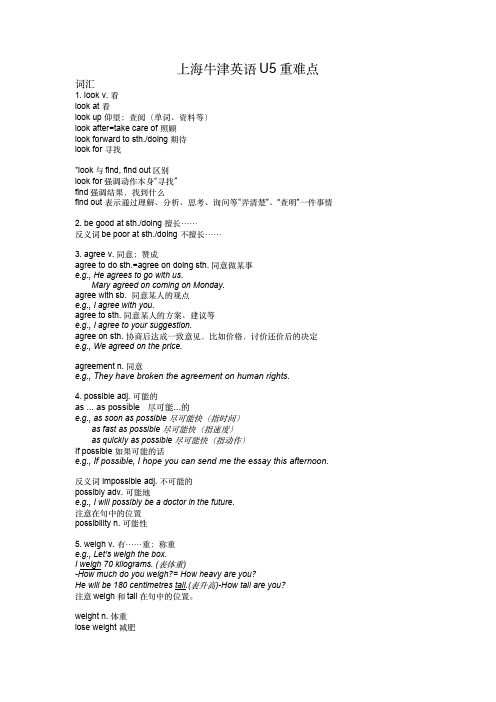
上海牛津英语U5重难点词汇1.look v.看look at看look up仰望;查阅(单词、资料等)look after=take care of照顾look forward to sth./doing期待look for寻找*look与find,find out区别look for强调动作本身“寻找”find强调结果,找到什么find out表示通过理解、分析、思考、询问等“弄清楚”、“查明”一件事情2.be good at sth./doing擅长……反义词be poor at sth./doing不擅长……3.agree v.同意;赞成agree to do sth.=agree on doing sth.同意做某事e.g.,He agrees to go with us.Mary agreed on coming on Monday.agree with sb.同意某人的观点e.g.,I agree with you.agree to sth.同意某人的方案、建议等e.g.,I agree to your suggestion.agree on sth.协商后达成一致意见,比如价格,讨价还价后的决定e.g.,We agreed on the price.agreement n.同意e.g.,They have broken the agreement on human rights.4.possible adj.可能的as...as possible尽可能...的e.g.,as soon as possible尽可能快(指时间)as fast as possible尽可能快(指速度)as quickly as possible尽可能快(指动作)If possible如果可能的话e.g.,If possible,I hope you can send me the essay this afternoon.反义词impossible adj.不可能的possibly adv.可能地e.g.,I will possibly be a doctor in the future.注意在句中的位置possibility n.可能性5.weigh v.有……重;称重e.g.,Let’s weigh the box.I weigh70kilograms.(表体重)-How much do you weigh?=How heavy are you?He will be180centimetres tall.(表升高)-How tall are you?注意weigh和tall在句中的位置。
上海6年级第一学期英语6A知识点Unit 5整理

Unit 51.(1)an Open Day 一个开放日(2)on an Open Day 在一个开放日2.Open Day programme 开放日活动安排3.(1)an entrance 一个入口处(2)at the entrance 在入口处(3)enter(动词)进入- ---entrance(名词)入口4. (1)plan the programme for their Open Day 为开放日计划活动安排plan the programme for…为…而计划活动安排(2)plan to do sth. 计划做某事plan ——plan n ing(现在分词)5. (1)arrive(arrived)in(大地方)/ at(小地方)sp. = get(got) to sp. = reach(reached)sp.到达某地arrive in 表示到达国家、城市等比较大范围的地方arrive at 表示到达车站、机场、学校的小范围的地方(2)When will the train arrive? 火车将什么时候到达?6 (1) at two o’clock 在2:00(2) at two fifteen / at a quarter past two 在2:15(3) at two thirty / at half past two 在2:30(4) at twenty to ten / nine forty 在9:407.meet them at the entrance 在入口处接他们8.visit our classroom, 参观我们的教室visit sp./sb. 参观某地/拜访某人(visit是及物动词,后面直接加地点或人,不可以加介词)9.look at our class projects 看一看我们的班级习作项目10.in the Arts and Crafts room 在美术劳技室11.listen to the school choir 听校合唱队(唱歌)区分:listen to 听(强调动作)hear 听见,听到(强调结果)12.in the hall 在大厅13.after that 在那以后表示顺序的词:First,…首先,第一Next,…紧接着Then …然后 (后面没有逗号)After that,…在那以后Finally,…最后14.look at a noticeboard 看一块布告栏区分:look at 看(强调动作)see看见,看到(强调结果)15.our English Club 我们的英语俱乐部16.(1)in the librar y在图书馆(librar ies复数)(2)borrow some books from the library. 从图书馆借些书17.have tea and cakes with sb. 和某人喝茶吃蛋糕18.in the Music room 在音乐教室19.finally ( 副词,最后) --- final ( 形容词,最后的) = at last= in the end.20.(1) want sb. to do sth. 想要某人做某事(2) want to do sth= would like to do sth 想要做某事21.welcome the parents 欢迎父母22.on the Open Day 在开放日23.(1) in different place s在不同的地方(2)in the same class 在相同的班级24.the teacher s’office教师办公室25.on the ground floor 在一楼(英式用法)26.on the second floor 在三楼(英式用法)27.write to sb. 写信给某人28.write an invitation to sb. 写一封邀请函给某人29.invitation (名词) 请帖—invite (动词)邀请30.(1)invite sb to do sth 邀请某人做某事(2)invite sb to sp. 邀请某人去某地(3) invite sb to dinner 邀请某人吃饭31.take(took)some photos 拍些照片32.have a good time / have a great time / have a wonderful time 过的愉快= enjoy oneself/ oneselves33.(1)一般过去式:表示过去某一时间内发生的动作或存在状态。
(完整版)牛津英语上海版6BU5复习资料(词组、词形转换、要点、补充练习)

6年级第二学期英语复习资料U5 What will I be like?词组与词形变换记忆表班级: __________姓名:_______________学号:___________一、重要词组:my possible future我可能的将来stand in front of a magic camera站在一架魔力照相机前take a photograph with it用它摄影look for the “start”button找“开始”按钮puts in a $20 note and presses the “start”button放一张20元纸币,而后按“开始”按钮Her photograph comes out and Kitty reads the note on the back. 她的照片出来了 ,kitty 读反面的说明This is me in 15 years ’time. 这是十五年后的我。
In 10 years’time, she will be slim, good-looking and more beautiful. 十年后,她会变得苗条,漂亮,更漂亮。
Peter will be 175 centimeters tall.彼得将有175 厘米高。
He’ll weigh 80 kilograms.他将重80公斤。
be good at singing / English善于唱歌/英语be poor at sports / maths / Chinese 不善于体育 /数学 /语文wear glasses戴眼镜put out fires灭火listen to music听音乐grow bigger长得更大read and write a lot 读写多write a report on my future写一篇对于我将来的报告practise English more 多练习英语learn how to make sick people better学习怎样使病人痊愈What would you like to be?你想成为何?I will be an astronaut. 我想成为一名宇航员。
沪教版英语知识点六年级

沪教版英语知识点六年级沪教版英语是上海地区广泛使用的英语教材,针对六年级学生,其知识点涵盖了词汇、语法、句型结构、阅读理解以及口语交际等多个方面。
以下是一些六年级沪教版英语的主要知识点:# 词汇- 日常生活词汇:如家庭成员、学校用品、日常活动等。
- 描述性词汇:如颜色、形状、大小、感觉等形容词。
- 动词短语:如“take off”(脱下)、“put on”(穿上)等。
# 语法- 一般现在时:描述习惯或经常发生的动作。
- 现在进行时:表示正在发生的动作。
- 一般过去时:描述过去发生的动作或状态。
- 一般将来时:表达将来的计划或预测。
# 句型结构- 简单句:主语+谓语+宾语/表语。
- 并列句:使用“and”、“but”等连词连接两个简单句。
- 复合句:主句+从句,如时间状语从句、条件状语从句等。
# 阅读理解- 理解文章的主旨大意。
- 识别细节信息,如人物、地点、时间等。
- 推断作者的意图和态度。
# 口语交际- 问候和告别:如“Hello”、“How are you?”、“Goodbye”等。
- 表达喜好和不喜欢:如“I like...”、“I don't like...”。
- 询问和回答:如“What's your name?”、“My name is...”。
# 写作技巧- 写日记:记录一天的活动和感受。
- 写信:表达情感、分享信息或提出问题。
- 描述性写作:描述人、物、地点等。
# 文化意识- 了解不同国家的节日和习俗。
- 学习简单的英语歌曲和诗歌。
- 认识英语国家的一些基本地理知识。
# 学习策略- 制定学习计划,合理安排学习时间。
- 通过多种方式学习,如听、说、读、写。
- 与同学合作学习,共同进步。
通过这些知识点的学习,六年级学生能够打下坚实的英语基础,为进一步的英语学习做好准备。
教师在教学过程中应注重培养学生的兴趣和自主学习能力,帮助他们形成良好的学习习惯。
- 1、下载文档前请自行甄别文档内容的完整性,平台不提供额外的编辑、内容补充、找答案等附加服务。
- 2、"仅部分预览"的文档,不可在线预览部分如存在完整性等问题,可反馈申请退款(可完整预览的文档不适用该条件!)。
- 3、如文档侵犯您的权益,请联系客服反馈,我们会尽快为您处理(人工客服工作时间:9:00-18:30)。
Unit Five
1)Phrases:
my possible future, in front of, a magic camera, in fifteen years’time, wear glasses, grow bigger, work in a bakery, write a report on my future,
2)Sentences:
1.First, Kitty looks for the ‘START’ button.
2.Nest, she puts in a ¥20 note and presses the ‘START’ button.
3.Then she smiles and waits for the red light.
4.Finally, her photograph comes out and she reads the note on the back.
5.This is me in 15 years’ time.
6.I’ll be taller and heavier.
7.I’ll be 165 centimetres tall.
8.I’ll weigh 55 kilograms.
9.I’ll be more beautiful.
10.I’ll be an astronaut.
11.What will I be like?
12.He is good at sports.
13.Jill loves listening to music.
14.Jill will be tall and slim.
15.She will be 168 centimetres tall.
16.She will weigh 52 kilograms.
17.I think Peter will be fireman in 15 years’ time.
18.Yes, I agree.
19.I think Jill will be a teacher in 15 years’ time.
20.No, I don’t agree.
21.She’ll possibly be a singer.
22.Ben loves taking photographs.
23.He is good at English and Chinese.
24.In 15 years’ time, Ben will be tall, but he will not be fat.
25.He will read and write a lot.
26.I’ll possibly be a policeman or a teacher, but I’d like to be a
doctor.
27.I’m good at Chinese, but I’m poor at English and Maths.
28.I have to practise English and Maths more.
29.I have to learn how to make sick people better.
30.What will you be?
31.I’ll be an astronaut.
32.That’s what I’ll be.
Vocabulary
1. possible adj. ←→im possible adj. possibl y adv.
2. weigh v. weigh t n. weigh -–weigh ed—weigh ed
3. high adj. h ei gh t n.
4. bake v. baker n. bak ery n.
5. tall --- taller --- the tallest
6. heavy --- heav ier --- the heav iest
7. beautiful --- more beautiful --- the most beautiful
8. big --- bi gger --- the biggest
9. stand --- st ood --- stood
10. report v. reporter n. sing v. singer n.
fish v. fisherman n. *cook v./n. cooker n.
11. agree v. ←→* disagree v. * agreement n. Grammar
1. What will I be like?
like prep. ←→un like prep. 像←→不像
like v. ←→dis like v. 喜欢←→不喜欢
2. in front of c.f. in the front of
e.g. Don’t stand in front of the air-conditioner.
Our teacher is giving us the lesson in the front of the classroom.
in front of ←→behind
*in the front of ←→ * at the back of
3. take a photograph = take a photo
take photograph s = take photo s
4. First, Next, Then Finally,
5. look for , find , find out
e.g. Tom lost his wallet. He is looking for it.
But he has not found it yet.
Ben wants to find out who broke the window.
6. wait for sth.
7. read the note on the back
8. I am 165 centimetres tall.
Q: How tall are you? / What is your height?
I weigh 55 kilograms.
Q: How heavy are you? / What is your weight?
/ How much do you weigh?
9. in fifteen year s’ time = in fifteen years
10. be good at = do well in
e.g. Mary is good at cooking. = Mary does well in cooking.
Tom is good at sports. = Tom does well in sports.
11. wear glasses a pair of glasses
区分wear put on have … on dress (in)
e.g. We should always wear school uniforms.
It’s cold outside. You’d better put on your coat.
It’s in winter now. I always have my coat on.
* Mr. Lin is dressed in a leather coat.
12. put out fire s listen to music
13. I agree. ←→I don’t agree.
14. grow bigger grow/ become/ get/ turn/ go + adj.
15. read and write a lot
a lot of c.f. a lot
e.g. We need to have a lot of vegetables every day.
We play basketball a lot every day.
16. I will possibly be a teacher.
17. have to do / has to do/ had to do/ will have to do
否定形式:don’t have to do/ doesn’t have to do
/ didn’t have to do/ won’t have to do
18. practise English and maths more more adv. 更多
19. learn sth. / learn to do sth. / learn how to do sth.
e.g. I want to learn music.
I want to learn to dance.
I want to learn how to dance.
20. That’s what I’ll be.
That’s what I’ll do.
That’s what I’ll see.
That’s when we’ll come back.
That’s how I’ll play basketball.
That’s where I’ll enjoy the view.
That’s why I’ll watch the film again.。
